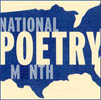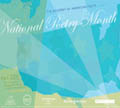April 2003 Marks Eighth Annual National Poetry Month
 The month of April always strikes an emotional chord. It's been taunted as the "cruellest month," flattered as the gentle lamb, and endured as that necessary soaker before the beautiful blooms of May can appear. Lyricists have extolled the romance of April in Paris. But Chaucer saw the sweet showers of April as a most propitious time to embark on a journey of discovery. In April 1996, the Academy of American Poets (AAP), with strong encouragement and support from publishers, booksellers, educators, and others, embarked on an enormous project to bring more poetry to the public -- National Poetry Month.
The month of April always strikes an emotional chord. It's been taunted as the "cruellest month," flattered as the gentle lamb, and endured as that necessary soaker before the beautiful blooms of May can appear. Lyricists have extolled the romance of April in Paris. But Chaucer saw the sweet showers of April as a most propitious time to embark on a journey of discovery. In April 1996, the Academy of American Poets (AAP), with strong encouragement and support from publishers, booksellers, educators, and others, embarked on an enormous project to bring more poetry to the public -- National Poetry Month.
National Poetry Month brings together publishers, booksellers, literary organizations, libraries, schools, and poets across the country to celebrate poetry and its vital place in American culture. Thousands of businesses and nonprofit organizations participate through readings, festivals, book displays, workshops, and other events.
National Poetry Month is, by all accounts, a runaway success. Booksellers have a hook for readings, events, and sales; and teachers and librarians can make use of some of the 200,000 free posters distributed, and online resources, including the free curriculum units offered on the Online Poetry Classroom (www.onlinepoetryclassroom.org ), provided by the AAP. For publisher sponsors, this is an opportune time to debut poetry titles. Over 160 new titles will be published this spring by the sponsors of National Poetry Month.
This year, in conjunction with the AAP's launch of the National Poetry Map of America on its Web site, a new collection, entitled Across State Lines: America's 50 States as Represented in Poetry (Dover), will be promoted and distributed free through an AAP partnership with the American Poetry & Literacy Project (www.poets.org/aplp). The National Poetry Map, to be unveiled on April 1, will include state-by-state listings of all possible poetry resources, including journals, publishers, bookstores with strong poetry sections, festivals, writing conferences, and programs, in addition to the state's poets and poems.
As the kick off event on April 1, AAP will host "Poetry & the Creative Mind -- a celebration and exploration of the ways in which poetry helps shape America's culture by inspiring and instructing the great individuals to which that culture gives rise." The ticketed event, co-chaired by Jorie Graham and Rose Styron, will be held in New York at the Julliard Theater at Lincoln Center. Information about the distinguished speakers and ticket information is available on the AAP Web site, www.poets.org.
 Charles Flowers, associate director of the AAP, talked to BTW about the steady growth of interest in poetry throughout the country: "We cannot take all the credit, but we [both National Poetry Month and AAP] are part of the success. The independent bookstores have embraced the program -- we often hear from a number of booksellers in May, and they report increased sales of poetry in April. Now that Book Sense has a Poetry 76 list, a lot of activity has been generated by that. The Book Sense Poetry 76 is really great."
Charles Flowers, associate director of the AAP, talked to BTW about the steady growth of interest in poetry throughout the country: "We cannot take all the credit, but we [both National Poetry Month and AAP] are part of the success. The independent bookstores have embraced the program -- we often hear from a number of booksellers in May, and they report increased sales of poetry in April. Now that Book Sense has a Poetry 76 list, a lot of activity has been generated by that. The Book Sense Poetry 76 is really great."
Although increased interest in poetry is hard to quantify, Flowers points to the large number of visitors to the AAP hub Web site, particularly during April. "We have tracked 380,000 unique visitors to the site this year -- that number has doubled in the last two years," Flowers explained.
Some may question poetry's role in the disturbing themes of the day -- terrorist attacks and threats, war, a global sense of alienation. Flowers talked of poetry as a powerful tool, one that helps individuals "reconcile complex feelings of grief, rage, and confusion." He recalled the impromptu memorials around New York City, immediately following September 11, 2001, with thousands of poems posted along with the photos of loved ones. W.H. Auden quotes were ubiquitous. For some time after, the AAP Web site devoted an area to poems inspired by September 11. Flowers mentioned other poets, including Robert Pinsky and Billy Collins, who provided comfort and solace through their work. "You don't go to the ballet with the expectation that it will contain and express your feelings, as poetry can," said Flowers.
Social justice, including antiwar sentiments, have long been expressed by poets. Flowers spoke of Walt Whitman in the Civil War, and countless others, who have acknowledged the suffering and expressed their desire for peace, as well as their love of country, through their poetry. He predicted that National Poetry Month will have special resonance this year.
 Through Web sites such as http://www.poetsagainstthewar.org/ and http://www.poetsagainstwar.org.uk/, poets have mobilized for peace. On March 5, Poets Against the War held an International Day of Poetry Against the War. Poets around the world scheduled over 120 readings and/or discussions of poetry and protest for that day, and poets presented copies of 13,000 poems to governments around the world, including in the U.S., Great Britain, Canada, Australia, Germany, Italy, and Mexico.
Through Web sites such as http://www.poetsagainstthewar.org/ and http://www.poetsagainstwar.org.uk/, poets have mobilized for peace. On March 5, Poets Against the War held an International Day of Poetry Against the War. Poets around the world scheduled over 120 readings and/or discussions of poetry and protest for that day, and poets presented copies of 13,000 poems to governments around the world, including in the U.S., Great Britain, Canada, Australia, Germany, Italy, and Mexico.
For information about National Poetry Month including schedule information, event listings, an image of the poster, and the National Poetry Map, go to on www.poets.org. To contact the Academy of American Poets, call Flowers at (212) 274-0343, ext. 15, or e-mail cflowers@poets.org.